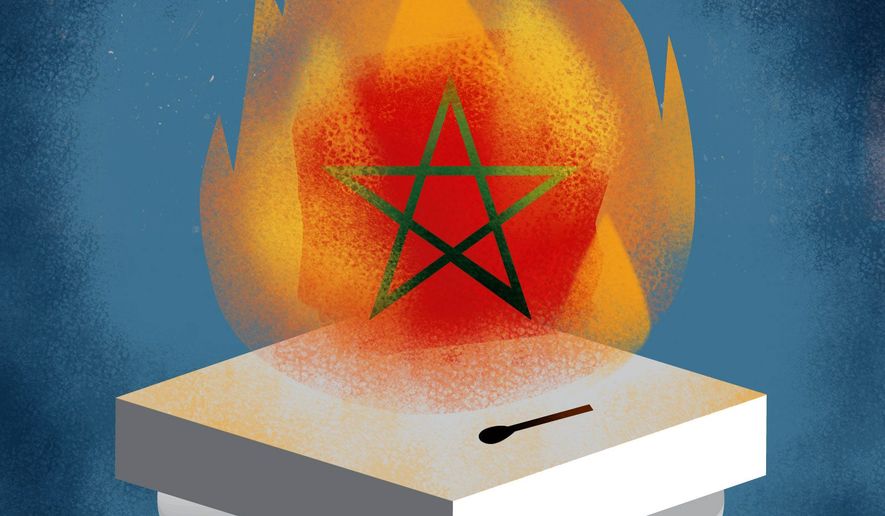OPINION:
Donald Trump, like most presidents in the final days of their term, is frantically striving to enhance his “legacy” with little regard for positions he has previously taken or defended.
He and his minions believe that a part of that legacy will be his thus-far successful effort to bring a semblance of peace to the Middle East. The recognition of Israel by Bahrain, Sudan and the United Arab Emirates have, they hope, signaled a sea change in the politics of the region. They’ve been working to expand the Arab nations willing to recognize Israel before Jan. 20.
The goal may be admirable, but like former President Obama’s Secretary of State John Kerry’s frantic and misguided Iran Deal for Mr. Obama, President Trump, Secretary of State Mike Pompeo and Jared Kushner have made a deal that is immoral, shamefully cynical and can only tarnish the president’s legacy. The King of Morocco has been angling for a trade; he would recognize Israel in exchange for United States’ recognition of his blatantly illegal desire to annex territory Morocco has occupied since seizing it by force in the 1970s.
Mr. Trump tweeted his surrender of the sovereignty of hundreds of thousands of people as “an historic breakthrough.” It was, in fact, an historic sellout. As a Bloomberg reporter concluded, “The biggest losers in the deal are the parties who had no say in its making: first and foremost, the people of Western Sahara. This is yet another blow to their aspirations for nationhood, which have been frozen since the departure of Spain in 1975.”
Former Secretary of State James A. Baker, who worked with the U.N. as a special envoy to try to facilitate the referendum responded quickly to the Trump announcement, saying “It would appear that the United States of America, which was founded first and foremost on the principle of self-determination, has walked away from that principle regarding the people of Western Sahara. This is very regrettable.”
The Western Saharans fought the Moroccan occupation on the ground for nearly 20 years while Moroccan troops drove hundreds of thousands of men, women and children across the border into neighboring Algeria where they still live in U.N.-run refugee camps waiting for the right to return home.
The U.N. brokered a ceasefire in 1991 after the International Court of Justice ruled that Morocco had no legal, historic, ethnic, or other right to the territory. The U.N. ceasefire included a promise agreed to by the parties that the people of the region would be given the right to determine their own future through a U.N. administered referendum — a referendum that has yet to be held because Morocco has steadfastly refused to let the people of the region have any say in their own future. Morocco has vowed that they will never give up the land they have seized despite the law, UN sanctions or anything else.
The United States has avoided deep involvement in the controversy but until last week supported the need for the agreed-to referendum. The Moroccans have spent millions of dollars over the years on D.C. lobbyists to keep the U.S. from siding with the Western Saharans on the theory that if the king holds on long enough the world will eventually decide to leave Morocco with what Africans refer to as the continents “last colony.” Thanks to a president intent on enhancing his legacy that is exactly what is happening.
The wording of the official United States announcement makes clear that we have reversed our long-standing policy by choosing to ignore the legal underpinning of the rights of the Western Saharans:
“As of today, the United States recognizes Moroccan sovereignty over the entire Western Saharan territory.” That statement consigns hundreds of thousands of men, women and children to a living hell. Those Western Saharans living within the portion of their land already under Moroccan control are subject to police and military harassment, imprisonment and torture, according to international human rights groups, the treatment that the president of the United States would allow to the rest of the people of the Western Sahara.
Sen. Jim Inhofe of Oklahoma is as familiar as anyone with the suffering of the people of the region and on learning of what the president agreed to said, “I am saddened that the rights of the Western Saharan people have been traded away.” Every American should be.
The United Nations responded quickly to the president’s deal saying the referendum should still be held, but with a stroke of a pen, the president has undermined the hope not only of the people of the region, but of those living in places like Taiwan, Hong Kong, South Korea and South Vietnam that they have the moral support of a country unafraid to stand up for what’s right.
The United States has sometimes quite properly, given our interests, stayed out of controversies like this, but one is hard pressed to find another situation in which we have virtually announced that justice doesn’t matter and that those like the Western Saharans who have sought their rights peacefully rather than via terrorism and the gun are fools.
The president may not realize it, but that message too will inevitably become part of his legacy.
• David A. Keene is an editor at large for The Washington Times.




Please read our comment policy before commenting.